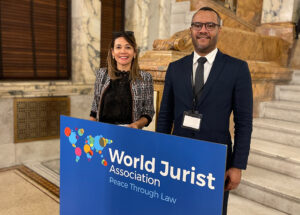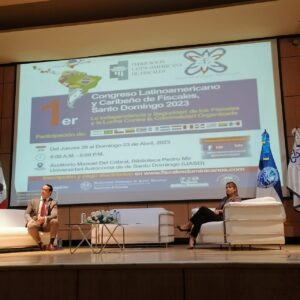Last week I was participating in the III World Forum on Human Rights held in the city of Buenos Aires, Argentina, together with Natalia Asmar, BA. The forum is a space for public debate on Human Rights in the world, the main advances and challenges focused on respect for differences, social participation and the reduction of inequalities, promoting equity and social inclusion.
In this third edition of the forum, topics of current interest in human rights were debated, in order to bring together national, regional and international organizations with a commitment to their validity and protection. Our intervention in the forum was within the thematic focus of human trafficking and it was about to public policies and the criminal process of the crime of trafficking; Other extremely interesting topics were debated during the forum in different panels, and one that undoubtedly captured my completely attention was that of surrogacy, as a type of reproductive violence perpetrated against women. What do we know about this and its implications in the life of the pregnant woman?
The surrogacy has been defined as the practice through which prior agreement carried out with a person or couple, a woman becomes pregnant with an egg other than hers and gives birth to a baby for that other person or couple, who become parents of the baby. The egg used for pregnancy usually comes from the intended mother or an egg donor.
Since its inception in 1970, surrogacy has raised strong moral, ethical, legal, and social controversies. The different positions regarding surrogacy are differentiated mainly between those that consider it as the exercise of individual freedom, freedom of choice for pregnant women and a governmental alternative against low birth rates, which leads to leave in second place economic and political mechanisms involved in this practice; and the other position is the theory in which they consider surrogacy as a form of exploitation and demeaning of women.
Seeing surrogacy as supported by the first stated theory, the individual freedom of the woman and her body for decision-making, is to see it in a cold and overwhelming way in others of her rights.
In surrogate motherhood, motherhood goes from being an act of love to a job; contracts are drawn up that limit the exercise of rights and decision-making to the pregnant mother, limiting clauses such as banning on traveling outside of her city or country during the gestation period, if she is the victim of any accident that endangers the life of the baby , the “buyers” can decide whether or not to leave her alive to save the baby, they can choose abortion if they wish, they are stipulated rights to return the baby in case it is not “what they expected”, and thus, a series of Fundamental rights begin to be violated one after the other, as a consequence of the signing of a contract in which one of the contracting parties renounces the right over his own body and her pregnant nature.
One of the characteristics of human rights is their inalienability: no one can renounce them even on their own free will, and for this reason they are also non-transferable. In this way, surrogacy leads the mother to renounce some of her rights, to limit a few others and to become merchandise of a third party who has acquired her at an amount and conditions of their specific interest. Therefore, the consent of a woman in which is reflected the violation, insult or limitation of her fundamental rights, cannot be taken into account, not even as valid for the indicated purpose.
In this regard, reference is made to the protocol to prevent, suppress and punish human trafficking, especially women and children, which complements the United Nations Convention against Transnational Organized Crime, known as the Palermo Protocol, in its article 3 letter b ) by prescribing that “the consent given by the victim of human trafficking to any form of intentional exploitation described in section a) of this article shall not be taken into account when any of the means set forth in said section has been resorted to.” .
Due to the characteristic that the contracting of a surrogate implies, it is evident that this behavior is framed within one of the modalities of the crime of human trafficking and therefore, in addition to the existence of women trafficking in extreme need, there is reproductive exploitation: their uterus are used to produce babies which they sell by contract to those who are dedicated to exploiting women, they market the product of their uterus using the women’s bodies as incubators to finally obtain the purchased merchandise: a child, a human being.
Another scenario that arises in the signing of a surrogate contract is when the surrogate mother does not want to continue with the signed contract in order to keep the baby and assert her rights as a mother. This as well trigger conflicts between the parties when the surrogate mother wants to claim a right that by nature corresponds to her, but that due to some condition of vulnerability she was led to contract an obligation and a commitment to the product of her reproductive nature.
Currently, this practice of surrogacy is only allowed in a very small number of countries. The legal situation of this practice is differentiated and ranges from express prohibition to detailed regulations, including the absence of legislation that directly mentions it in some countries, such as ours.
The III World Forum on Human Rights achieved its objective: to bring governments, nations, and civil society closer to a deep reflection on all the problems and novelties that we see parading in the world of our rights, how some run over with new practices and how the need arises to recognize others that do not harm us, rather protect us. Special thanks to the Secretary of State for Human Rights of Argentina, the UNESCO International Center for the Promotion of Human Rights (CIPDH-UNESCO) and the Latin American Observatory on Human Trafficking and Smuggling for extending the invitation. And even more special thanks to the Banco de Reservas of the Dominican Republic for their support and sponsorship.
Sonia Hernández is a criminal lawyer, former prosecutor of the Santo Domingo Province. She has a master’s degree in Fundamental Rights from the Universidad Carlos III de Madrid, Spain and a specialization in Criminal Procedure Law from the Universidad Autónoma de Santo Domingo (UASD). She is currently a practicing attorney and independent consultant for the International Justice Mission, Dominican Republic (IJM).






